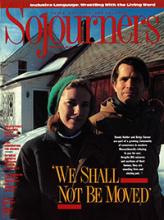Lutherans to Decide on Divestment Compromise
The Evangelical Lutheran Church in America (ELCA), formed through a merger of three Lutheran church bodies January 1,1988, has been clear about divestment from its birth. At its constituting convention in May 1987, delegates expressed "unqualified opposition to the apartheid system in South Africa" and pledged that the ELCA would "work tirelessly to see that none of our pension funds will be invested in companies doing business in South Africa." As far back as 1977, world Lutherans declared that opposition to apartheid was a matter of status confessionis; that is, apartheid is heresy.
But moving from convention resolutions to practical actions is another matter. Though others have tried, no major denomination's pension plan has been able to divest its holdings in companies that directly or indirectly invest in South Africa. Lutherans are not unique: When church pension boards get down to business, the phrase "fiduciary responsibility" always pops up. And the issue boils down to how to put into practice the church's opposition to apartheid and still invest pension funds in such a way that will provide maximum gain.
From the beginning the Board of Pensions, which is separately incorporated though the trustees are elected by the ELCA Assembly (the denomination's national representative body), made it clear they were more worried about being sued (they are liable as individuals) than about pressure from the denomination's Church Council.
Read the Full Article
